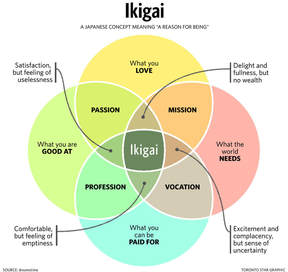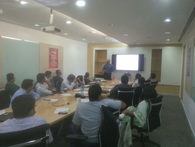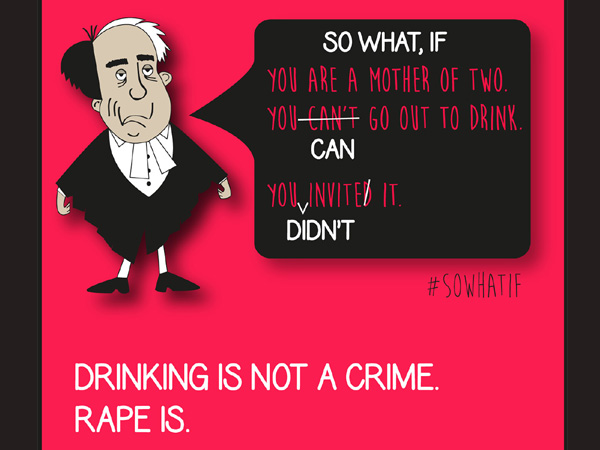What is the role of work in our life? Is leisure really the opposite of work, or more correctly, is work merely the means to finance a life of leisure, if not right away, then in the future? The parable of the small fisherman and the big businessman captures some of these questions. We have versions of the story as one between a Mexican fisherman and an American investment banker, or an African fisherman and a British banker (as in the video linked here), or a Mumbai stock broker and a Goan fisherman - multiple versions of the same really. We could have a conversation on the class/ colonial/ race subtexts of these stories another day perhaps, but for now, taking the parable as is, does one look at it and say if work and ambition is about attaining a certain kind of leisure, then why not seek a measured leisure right away?  Then, on the other hand, is the idea of Ikigai - of what work can really be. Work as a life's journey, a way of being where what one loves to do, what is needed, what pays the bills and what one has the capabilities for meet in this wonderfully utopian space of Ikigai, where work is no longer a trial or a sufferance, but a joy that is worth the effort and the pain, and brings rewards and impact as well. Ah! What a space to live in where work is beautifully satisfying. Like the perfect curd rice, or that right on the dot tenderloin steak - or whatever rocks your boat, that keeps you going for more and more and you can stay engaged in it forever. Then again, is it worth it if this search for Ikigai overshadows everything else? Should work be a priority over home, family, health etc? One would hope that one can have Ikigai but still be alive and happy in other ways as well. Within this conceptual diagram of what Ikigai is, the idea of a 'Professional World' is where many of u find ourselves: Professional workplaces with people working to get better and better at what they are doing and getting better and better compensation for it. This is also where much of the discussion on Mental Health in the Workplace happens. For a large number of us, the things we love and things we know the world needs become hobbies or social projects/ weekend volunteering, and the professional workplace is the mainstay that provides security and safety, and satisfaction to the extent it does. Who we are at the workplace, and how the workplace is to us both are key for mental health. If we are but shadows of ourselves in the workplace and/or if the workplace is a tyrannical grindstone, work soon ceases to be even a profession and descends into drudgery, or worse. The tango between the worker and the workplace needs only either of them to mis-step for it to quickly cease to be the dignified profession it seeks to be and become a mockery of it at extremes being a slave-house or a den of ineptitude dragging a once-great idea into bankruptcy, in the tug between the 'Professional Life' and the 'Personal Life.'
Listening to her and thinking further about it, there are a few things that seem really key to good mental health in the workplace for the individual:
1. A keen respect for one's work, including an ongoing spirit to learn and improve 2. A balance between work with other passions, including love and joy, and letting one defer to the other when needed. 3. A willingness to fight against injustices, and win allies in the process that can help change unjust systems rather than stay under its tyranny 4. An ability to take help when needed, and to hold the longer-term view on life and living. Mental health in the workplace is more personal than about personnel. When we know what place work has in our lives, and can expect and influence our workplaces to care about what's personal to each of us and help as they can, we will see greater mental health in the workplace.  As it happens at this time of the year, at InnerSight we often find ourselves facilitating discussions on a number of topics related especially to women in the work place, in the context of organisations celebrating Women's Day. Last year, a company in Bangalore had made big plans for the day. They had planned a fashion show, a cookery contest, special shopping festivals and many other events over a three day period around Women's Day to really celebrate the day in a big way. We were a part of the event with a small workshop for interested participants to discuss gender roles, prejudices and perceptions in the work place. Given the rest of the plans, it was interesting to note how much the group talked about the selection of events to mark womanhood - cooking, clothes and shopping. Some of the women were livid at the typecasting, while others were talking of it just being for fun. The few men in the workshop, quite tactfully, kept mum! It left me thinking then, and I am reminded of it again now, as to how deeply gender roles are engrained in our collective psyche, and how much of a struggle it is to break out of those roles to reinvent roles in relationships. Even now, the idea that cooking, cleaning, child-care and home affairs are in the women's domain is so deeply engrained, that for many working women, it feels like they are in two full-time jobs all the time. Some people, of course, feel they are making these choices themselves as free and empowered people - they want to do it all, and yet, when you scratch that surface, there usually are deep-rooted messages on what it means for them to be a 'good' person, and the costs they are paying, be it exhaustion, emotional and physical, resentments, anxiety and more become quite evident. We don't have to dig far to see where it comes from. Our ads, movies and TV shows do a great job of reflecting the glorification of the working woman who slaves away at home as well - the villainous women are often the ones who are working outside but not at home, and the virtuous women are the ones who do everything. Our new heroes are then the Super Woman who can do it all, and all that with a perfect smile while looking like she stepped out of a magazine cover. A few months back, on Mother's Day, we wrote this. Today, as we approach International Women's Day, we are asking the same questions again, in a larger gender context: "Should we really be celebrating the 'super-woman' status? Can we look at the pressures and stresses that women go through, and actually make it easier?" (paraphrased). This International Women's Day, as we celebrate womanhood, let's also pause to ask ourselves what are we celebrating, and what could possibly change about it. And have things changed at the organization we started this post with? This year, we hear they have fashion shows, cookery contests, a sack race through the office corridor, a hackathon - and all events are open for all genders :) The Economic Times covers Snapdeal_HR's diversity initiative 'Advitya'. InnerSight.in is proud to be a part of this initiative, along with JobsForHer and Enable India.
We believe initiatives like this encourage more people across the spectrum of diversity to seek out and benefit from employment opportunities, bring greater visibility and discussion on diversity, and help us all be more inclusive. For more details: [email protected] http://economictimes.indiatimes.com/small-biz/startups/snapdeal-kicks-off-diversity-initiative-advitya-in-a-bid-to-attract-and-retain-talent/articleshow/48337273.cms?from=mdr We met Marilyn(name changed), a few months ago - a 26 year old woman, a passionate software engineer, who married across communities and after two years in her marriage, found herself in a difficult pregnancy and after her maternity leave, had to leave her job for a little over a year to care for herself and her baby with very little help from her families. After the break, she wants to get back to work but finds it really hard even to get interview calls and finds the interview process tough with intrusive questions about her personal life. It makes her question her own capability needlessly, and affected her quite deeply. There are thousands of very capable and highly trained engineers, designers, architects etc like Marilyn. I am sure each of us know many such people. On the other side of the story, we hear in the news of a jewelry marketing firm that was in the docks for refusing to hire an otherwise perfectly capable person, stating his religion was the reason they refused to hire him we have been thinking about what makes diversity so hard for some organisations to incorporate, and if not for legal reasons, would companies bother about diversity at all. What makes it so hard to build an inclusive work place for Marilyn, and for many others who are for one reason or the other, outside the norm? In some ways, the push to embrace diversity versus the pull to stay as insular a group as possible is somewhat a given struggle. If one leaves things to evolve as they will, we will probably see a lot more very insular groups filled with very similar groups of people. While organisations such as the one in the news do survive, and sometimes thrive, history and evolution teaches us that generally such insular groups tend to not survive in the long run - not among groups of people, and not even species as a whole. Of course, many forms of diversity are now almost mandated by laws that make certain forms of discrimination illegal. However, beyond mere legal compliance, we think many modern organisations recognize the homogeneity and tendency to homogenize is a threat, not only because the pool of resources within that homogeneous mass is limited, but also because operating in a world of diversity requires those in it to adapt, be creative, challenge itself and be nimble - something diversity brings much more than homogeneity can. Often, in long standing organisations, efforts on this front start on a lack of diversity being brought to one's attention (like with the firm we started this post with) and from that stems an effort to bring a greater diversity into the system, with special focus on the specific diversity need. This is very much needed, but isn't a pleasant or an easy task - not for those being brought in, nor for the system that has to adjust to the change. On the other hand, how wonderful it would be to create spaces with a lot more mindful effort to build in greater diversity as part of the DNA of organisations. We in the 2010s are blessed with an ecosystem of a whole lot of brand new companies and business opportunities, and with them the opportunity once more to do so. At the outset, we have to begin with an understanding of what we are talking about when addressing the need to be more diversity-friendly. Are we talking about gender? Disability? Race? Sexuality? Language? Also, are we talking about greater access? Equality? Fair work place policies? Non-discrimination? Affirmative action? Needless to say, it can get quite intense quite quickly, but keeping a really broad commitment to diversity can help much more than a very specific focus. The larger picture apart, the most basic of the challenges on the ground is about access to the workplace. While certain aspects of diversity may not necessarily face hurdles in access (caste, community or sexuality, for instance) others face difficulty in joining or re-joining the workforce. People with disabilities face such challenges. Women, especially women who have gone through a maternity break are another group who find it difficult. Companies might be skeptical about skills, fitment or commitment, and tend to go with an 'easier' candidate, which restricts access. By providing bridging opportunities, both in full time roles and through internships, such access can be made available. Returnee Internships allows the person the time to ramp up, as well as time for the organisation to ready any structural support needed. For women like Marilyn, there is some help at hand through organisations like JobsForHer, a portal that is specializing in such a market, and helping enable opportunities to women who are on a career break. Enable_India and Silverlinings have been working with organizations to provide corporate opportunities to people with disabilities. Companies like Snapdeal are adopting these programs, and providing policy and training support to their teams to make diversity and inclusion a reality in the workplace. Once in the workplace, managing diversity is an ongoing activity. Making the workplace safe, secure and enabling for all people is a challenging task given that each of us might be in the majority in one dimension, while feeling the pinch on another. Developing and maintaining a culture of not mere tolerance, but active support and appreciation for all is a hard task, especially when it comes to the less easily perceived dimensions of diversity such as sexuality, food preferences, marital or parenting status etc. Doing this through a system of policies and policing through strong anti-sexual harassment initiatives and safe space policies is needed, but at the same time, it helps to have a softer cultural change process that actually raises awareness and builds empathy within and between teams. Without the focus on developing a broader cultural commitment to diversity and support, any specific focus or highlighting one aspect of diversity could easily be interpreted as being at the cost of others, and then it could have unintended effects where the majority might end up resenting others thinking they are being given 'special privileges' while really it is just attending to special needs so they can be as engaged in their job as others. That would defeat the purpose altogether. To check whether such resentment is true, one only needs to see how maternity and maternity related leaves are treated in a team. While strong policies exists and people avail such benefits, does it leave some of the menfolk, or those choosing to be child-free, feeling a little short-changed, as if they work as hard for lesser? Some organisations have sabbatical policies and other times-off benefits, linked to length of service and performance, but does it become a burden for organisations? Is it then about fine balances, or about equality and justice? Where do the cost-benefit calculations shift the balance back in favour of some homogeneity and lesser diversity? A lot to think about, for sure.  InnerSight congratulates Snapdeal on its commitment towards diversity and inclusion at the workplace, and is happy to have been an integral part of "Advitya". Thank you, Snapdeal for inviting us to talk to your team about Diversity in the Work Place. The Vishaka Guidelines of 1997 and the subsequent Sexual Harassment of Women at Workplace (Prevention, Prohibition and Redressal) Act, 2013, have gone to great lengths to specify systems, processes and protocols to make the workplace safer and our lawyer friends tell us, are among the best such laws in the world.
While the law is quite rigorous, the implementation especially at the local district and state levels is still nascent. However, many leading corporates and institutions have gone ahead and implemented the Act in letter and spirit, often going beyond the law to cover all genders and taking a larger workplace safety view beyond sexual harassment. That said, all too often, reporting and getting action on sexual harassment is a real ordeal, even in work spaces where all the policies and protocols are in place. Often, the idea of where the incident(s) took place and whether they were at the office premises become the first line of questioning, and despite the growing virtual workspaces and blurring of boundaries between work and private spaces, and the wide definition of 'in the course of employment,' there is a reluctance to fully investigate a complaint if the incident happened outside the office. Secondly, despite very specific guidelines on how cases are to be documented, confidentiality is to be maintained, closure obtained and communicated, often action is through undocumented meetings, verbal commitments and actions oriented towards creating a 'compromise' especially where no hard evidence exists. Thirdly, leaks in the process mean the 'news' gets out, other employees take sides or form opinions and the work environment could become hostile for either or both the parties. In the process, the complainant who is reporting an offense ends up feeling victimized all over again, or - on the other hand, the one complained about finds their reputation tarnished even before they have had the slightest chance to defend themselves. Many times, the process is exhausting emotionally and the parties just want to close and move out or move on, and that then can leave the complaints committee with questions of what is fair or just, and if they really addressed the complaint fully. Point is, creating safe working spaces need to go far beyond documenting policies and procedures. Sensitizing all the people involved in the process is critical to its success, as is ensuring confidentiality and maintaining rigorous documentation. Wide-spread communication and keeping up awareness on the rights & responsibilities of all staff is important. That said, while there are some baseless and malicious complaints intended only to hurt, the larger reality is that most complaints are genuine and yet victim-blaming continues to be the norm. The complainant's personal history, habits, prior relationships, performance history at work, history with the person in question and everything else gets dredged up. That needs to stop for more people to feel confident enough about the system and the processes to report any issues, and for the work place to be fully safe. This post is inspired by a social media campaign by Himani Auplish aiming to increase awareness among the people about harassment after the harassment |
InnerSight BloggersAjanta, Mahesh and other InnerSight counsellors and guest contributors are happy to share their thoughts here. Categories
All
Archives
September 2020
|


 RSS Feed
RSS Feed